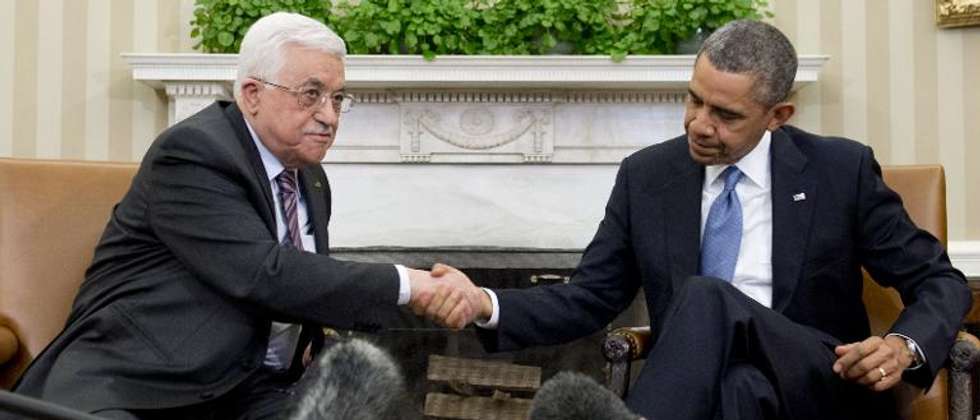In the U.S. president’s 1st public comment on the Hamas-Fatah unity deal, Obama suggests pause in peace talks may be needed so get both sides back on track.
By The Associated Press
President Barack Obama says the halt in negotiations between Israel and the Palestinians underscore how neither side has shown the political will to make tough decisions that would sustain Mideast peace talks.

Mahmoud Abbas & Barack Obama at White House on 17 March 2014 – Photo: Saul Loeb/AFP
Obama says reconciliation agreement between the Palestinian Authority and the militant group Hamas is the latest example of, quote, “unhelpful” steps that have undermined discussions.
Obama says a pause in peace talks may be needed so both sides can consider the alternative to negotiating.
Obama spoke during a news conference with South Korea’s President Park Geun-hye, a day after Israel broke off Mideast peace talks in protest the Palestinian Authority and Hamas agreement.
News of a Palestinian unity government threatened to derail already faltering peace talks, with Israel deciding to “suspend” peace talks in response to the move and launch an information campaign against Hamas and Palestinian President Mahmoud Abbas.
Prime Minister Benjamin Netanyahu convened his inner security cabinet Thursday morning for a six-hour session to discuss Israel’s response to the reconciliation announcement between rival Hamas and Fatah.
Insiders say Netanyahu had agreed to Abbas’ demands for extending peace talks – a three month settlement freeze in which time the parties would talk final border arrangements – but back tracked after the unity deal was announced.
However, the supposedly unified Israeli response came after a tense cabinet meeting which strained already shaky coalition relations, and which could have resulted in a more severe response.
At the end of the session, one of its participants described it as “long and exhausting,” with cabinet members arguing for hours on the exact wording of the statement and nature of the sanctions.
Justice Minister and Chief Israeli negotiator Tzipi Livni was adamant in her demand that the Israeli response be moderate and leave room for the renewal of talks should the Palestinian unity agreement fail to be implemented.
On the other hand, Netanyahu and Bayit Yehudi Chairman Naftali Bennett pushed for something more severe, and wanted to bar any direct talks with Abbas.
Livni’s persistence was what prolonged the meeting and resulted in “measured” sanctions which “will not cause the Palestinian Authority to collapse,” as Livni later described them.
In an interview with MSNBC after the security cabinet meeting, Netanyahu appeared to have moved closer to Livni’s position and seemed to leave open a window for future talks if Abbas reversed course or reconciliation with Hamas, seen by the West as a terrorist group, fell through.
“I hope (Abbas) changes his mind,” Netanyahu said. “I will be there in the future if we have a partner that is committed to peace. Right now we have a partner that has just joined another partner committed to our destruction. No-go.”
Bennett for his part called the decision to halt peace talks a “balanced and right,” adding that “You don’t talk to murderers.”
View original Ynet publication at: http://www.ynetnews.com/articles/0,7340,L-4513244,00.html







 Israeli New Shekel Exchange Rate
Israeli New Shekel Exchange Rate